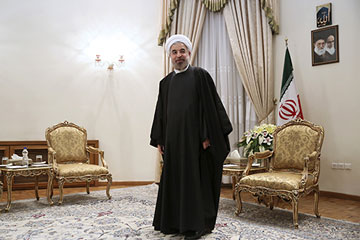
President Rouhani holds the key to Irans economic revival.
(4 of 6)
Key levers of power remain beyond Rouhani's reach. Both the judiciary and parliament are still dominated by hard-liners, as are the politically powerful Revolutionary Guards. Two of the presidential candidates from the disputed 2009 election--both long-standing Rouhani friends--are still under house arrest. Rouhani's social-media accounts may be his most potent tools in those struggles.
For now the agenda of the Rouhani realists is modest compared with that of the ambitious but failed reform era of the late 1990s. "Expectations were wild during Khatami's presidency," explains Hadian, the political scientist. "Now they're more balanced." The core issue since the revolution has been whether the Islamic Republic of Iran's political identity is first and foremost Islamic or republic. Reformers favor a republic, including limits on the Supreme Leader's powers. Hard-liners fear the demise of ideology and religious influence in politics. The issue is far from settled, but realists want to open up political space rather than overhaul it. At an Aug. 3 inaugural event, Rouhani called it "a patient approach ... in order to be distant from the abyss of extremism."
Fear of Betrayal
If Tehran's ubiquitous billboards are any indication, Iran's hard-liners are just waiting for the right moment to pounce. In October, flashy new billboards went up overnight on numerous streets depicting U.S. and Iranian diplomats taking part in negotiations. Above the table, the American was dressed in suit coat and tie. Under the table, he was clad in military fatigues, and a concealed shotgun on his lap was aimed at the Iranian. american honesty, the billboards warned.
Rouhani's allies in city government scrambled to take them down, claiming they were unauthorized. But some visual reminders of the recent past and lingering mistrust remain. A 10-story billboard on Vali Asr Square, a holdover from the Ahmadinejad era, still shows President Obama chummily leaning on Shemr, a 7th century villain credited with betraying the first Shi'ite martyr. be with us. be safe, its caption reads.
Betrayal, which is at the heart of Islam's greatest schism--when Shi'ites split from Sunnis 14 centuries ago over who was the rightful heir of the Prophet Muhammad--still shapes the hard-line narrative in the world's largest Shi'ite country. "The Americans don't want to solve their problems with Iran," says Hossein Shariatmadari, editor of the newspaper Kayhan and one of Tehran's most vocal hard-liners.
Shariatmadari was sentenced to life in prison in the 1970s for opposing the Shah; he was freed only after the monarchy ended. He rejects both the nuclear deal and eventual reconciliation with the U.S. "There are 17,000 atomic bombs in the world, and most of them belong to the U.S., Russia, China, Britain and France. Israel is estimated to have 300. And the U.S. is afraid that one more bomb might be made? Isn't that ridiculous?" he scoffs. "Obviously, they're afraid of something else. They're concerned about Iran as a model for Islamic countries."
